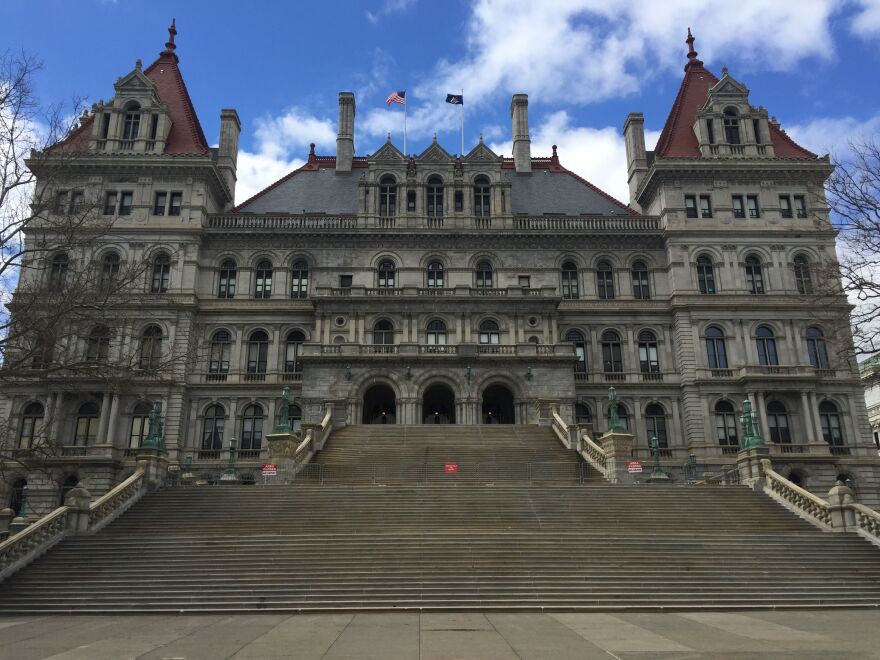State lawmakers have just one week until the state budget is due, and despite the coronavirus outbreak, they say they intend to meet the deadline and will use precautions to avoid meeting in large groups.
They face a daunting task of putting together a spending plan while a multibillion-dollar deficit grows each day.
New York State Comptroller Tom DiNapoli said on March 17 that the state’s $6 billion deficit could grow by $4 billion to $7 billion. Now, even those numbers appear outdated.
Gov. Andrew Cuomo said Wednesday that the deficit could rise to $15 billion, as the stock market tanks, and the economy is at a standstill.
Despite those challenges, Cuomo is confident a spending plan can be in place by April 1, and it can even have some of the other unrelated items in it that Cuomo has proposed. They include legalizing the adult use of recreational marijuana, rolling back some of the bail reform changes that ended most forms of cash bail on Jan. 1, and banning flavored vaping products.
“We will pass a budget and address the policy items that we laid out and we discussed,” Cuomo said on March 23. “We’re going to pursue all of them.”
Cuomo is also seeking greater powers in the budget to move money around later in the year, as the state’s true financial picture becomes clearer. His budget director, Robert Mujica, said the budget office might need to hold payments back at times, or change or increase health care payments as the year goes on.
“You’ll have to do a budget that has flexibility,” Mujica said.
David Friedfel, with the fiscal watchdog group Citizens Budget Commission, said giving the governor new powers in the budget would set a bad precedent. He said it’s better to have the Legislature come back later in the year, when hopefully it will be safe to meet again, and consider the changes.
“They should come back in three months, six months, whenever is necessary in order to amend the budget,” Friedfel said. “It’s better to do that than to set up a system where the executive would enshrine themselves with additional power.”
Some, including the Republican minority party leaders in both houses of the Legislature, say lawmakers should do a bare-bones budget that sticks to spending-related items. They say there’s time to do other policy items later in the year, when hopefully it will be safe for the full Legislature to meet again and to once again allow lobbyists and interest groups into the Capitol. The building is currently closed to visitors.
Friedfel agreed: “Later on, when things return to normal, then you could come back and address those important policy issues.”
The Senate and Assembly have not held session for over a week. When they met briefly on March 18 to approve paid sick leave for quarantined workers, Senate Leader Andrea Stewart-Cousins said the entire spending plan has to be re-evaluated.
“Every single assumption that we had has got to be challenged,” Stewart-Cousins said, “and has got to be adjusted for the realities that we are in.”
Progressive groups and some Democratic lawmakers want to raise taxes on the wealthy to help balance the budget. Stewart-Cousins is against that idea. She represents parts of Westchester County, and several members of her Democratic conference are from Long Island, where combined state and local taxes are already the highest in the nation.
“I don’t know how we tax our way, frankly, out of this,” she said.
Stewart-Cousins said federal help is needed.
Assembly Speaker Carl Heastie agreed that New York is not going to be able to manage on its own.
“If we don’t do something that continues the circulation of money into the national economy and here in New York state,” Heastie said, “we are going to be headed for maybe not even a recession but a total depression.”
Cuomo is not pleased with federal bailout efforts so far, and he said the bill passed by Congress on Wednesday is not enough, and would only give New York $3.8 billion for its budget.
“How do you plug a $15 billion hole with $3.8 billion?” Cuomo asked. “You don’t.”
U.S. Sen. Chuck Schumer, D-N.Y., who is also minority leader, has a widely different estimate of the benefits for the state.
He said New Yorkers will get $40 billion from the aid package, when the $1,200 aid checks for each adult and small business, and extended unemployment is factored in. Schumer said billions of dollars will immediately flow to New York’s hospitals.
Cuomo’s press secretary, Dani Lever, said in a statement that, “as a percent of our total state budget -- 1.9% -- it is the second-lowest amount in the nation. Literally 48 states get a higher percentage in funding than New York state. For example, South Dakota gets 17.9%.”









